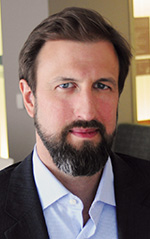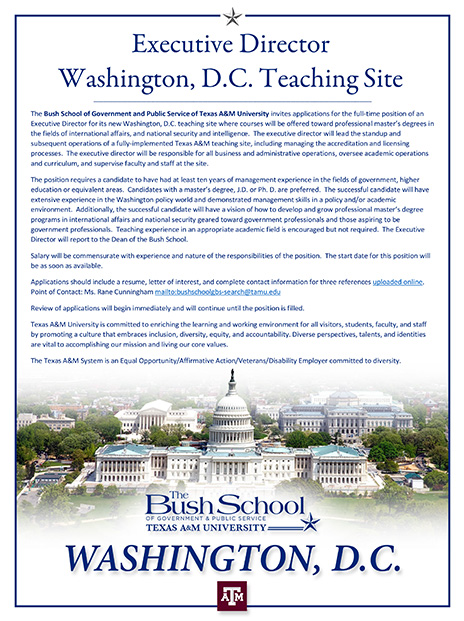There’s a Playbook: From Ebola to COVID-19
Jeremy Konyndyk mines his experience leading the U.S. Ebola pandemic response effort to offer insights into meeting the challenge of COVID-19 today.
AN INTERVIEW WITH JEREMY KONYNDYK
Jim Bever: As the head of USAID’s Office of U.S. Foreign Disaster Assistance during the Ebola crisis in West Africa, what was it like for you to lead and be part of the leadership team for the American people’s global response?
Jeremy Konyndyk: There was a very clear sense of purpose and ownership with Ebola, from the president on down; the U.S. government was going to do whatever was necessary to end this outbreak. One of the difficult things about outbreaks is that they require a really uncompromising approach.
In normal day-to-day activities of governance, we’re used to a certain amount of compromise. You’re never going to get everything you want. In an outbreak, you have to stop every case. Your job has ended when the last person who has the disease does not pass it on to another person.
It takes this immense and uncompromising discipline, rigor and sustained commitment to defeat an enemy like this. Our normal systems of governance are not set up for that, and it takes an adjustment.
By definition, because it’s a novel situation, no one has turf that covers all of what needs to be done, so everyone has to go outside their comfort zone and do things that are unusual.
And that takes presidential leadership, at the end of the day. To get the government to do things it’s not used to doing, to push the bureaucracy outside of what it’s built to do, that doesn’t happen organically. Bureaucracies don’t do that organically. It takes leadership, so we were fortunate that we had that.
JB: Focusing on the U.S. interagency, where resources and policy decisions flow from and then project out to the field, what is the role of U.S. diplomats, the State Department and the field presence that comes with our USAID missions and embassies in most countries? How did that play into the Ebola response? Would you share with us lessons learned there?
JK: At the Washington level, the State Department really struggled at first, because they couldn’t figure out things like who would they send to the deputies meeting. Who’s the right policy lead on this in the department? Is it an Africa regional issue, a health issue, a science issue, a multilateral outreach issue? Because it’s all of those things.
Eventually what they did do was set up a special Ebola unit within the State Department, and they brought back [Ambassador] Nancy Powell and, later, [Ambassador] Steve Browning. Once they went to that format, it really helped, because it gave the State Department a senior-level focal point who could bring together all the different strands of what the department had to do.
One of the important, innovative things they did was set up a medical unit that organized medical evacuations. They took the lead on identifying one of the only companies in the world that had a medevac capability that could handle the biosecurity containment standards that were required for Ebola patient transport.
They locked those two planes down on a contract; and in a show of global solidarity, they opened that up to the world. Americans had the right of first refusal, but it was something the whole world could buy into. If it were a choice between American and non-American, the American would take precedence; but we didn’t then just keep it for ourselves.
One of the challenges is that it’s not just a health issue. As we see today with COVID, it becomes a political issue with implications for all sectors of society, the economy and security.
JB: What role did our diplomats play in mobilizing support in West Africa?
JK: Globally, the State Department was very involved in reaching out to other countries and encouraging them to join the fight. This was a very big priority for the president; he didn’t just want us to go in and do our part, but also to galvanize global action.
It really started with President Obama convening world leaders at the United Nations General Assembly in September 2014. He organized and led, along with [then U.N. Secretary-General] Ban Ki-moon, a kind of impromptu world leaders’ summit on Ebola. He spent countless hours on the phone talking to foreign leaders to encourage them to join the fight. The State Department played a huge role in facilitating that whole process.
If we were going to make a specific ask of a country, which we often did, the State Department and the embassies had the role of formulating what they thought that country might be able to do, facilitating the call between the heads of state, and then following up to make sure that the country was actually moving to deliver on what they had committed to do.
There was also the constant demarching to other countries that this was a U.S. priority, especially in the early stages.
The embassies in the affected countries also played a major role. In Liberia, President Johnson-Sirleaf set up something called the President’s Advisory Committee on Ebola, and U.S. Ambassador [to Liberia] Deborah Malac joined those meetings, but so did the Centers for Disease Control and Prevention and the USAID rep, and they were allowed to speak and give their expertise. Ambassador Malac did a masterful job of keeping everyone aligned, allowing everyone to speak and making sure all the different components that had been deployed in her country were staying in sync, but enabling them to share and speak their expertise—which not all ambassadors necessarily do. She did a fabulous job.
One of the challenges with this kind of novel outbreak is that it’s not just a health issue. As we see today with COVID, it becomes a political issue with implications for all sectors of society, the economy and security, so all those channels need to be engaged. The ambassador has an important role in doing that, facilitating that dialogue and that engagement, and doing that in a way that also is respectful to and enabling of public health expertise.
It’s always a matter of how to balance the science and the public health guidance, and navigating the political reality of the country. That relationship between the outbreak responders, the ambassador and the embassy is just extraordinarily important.
JB: Do you have any takeaways about the role of the World Health Organization during the Ebola crisis?
JK: During the Ebola outbreak we saw some of the worst and, eventually, some of the best of WHO. Early on we saw a combination of downplaying the risk in deference to some of the sensibilities of the affected member states and failing to have the robust emergency team needed—because in the past member states had wanted WHO to play the role of a normative organization rather than an operational organization. WHO’s performance in the later phase of the Ebola response showed their potential and emphasized what they could have done had that posture and capability been institutionalized at the beginning of the outbreak.
What we then worked on for the next few years—and what I’ve been involved with in a personal capacity since—was a major overhaul within WHO to create a new emergency response team. In the four years since those reforms were passed we’ve seen a really significant transformation.
WHO has come in for a lot of criticism during COVID-19, and I think most of it is misplaced. There are shortcomings, one of which is that they are too deferential to member states, which diplomats will recognize is simply how we’ve built the multilateral system today. Every U.N. institution is deferential to its member states, and that is by design because that is how the member states have traditionally wanted it.
Within the parameters allowed it by the member states, WHO’s been pretty accurate. Within three weeks of the notification of this novel disease no one knew anything about, they were able to provide a pretty reliable characterization of the virus, how transmissible it was, how dangerous it was—and it holds up pretty well now. WHO has also done a lot of operational work they would not have been capable of years ago. For instance, they’ve set up an air bridge to provide personal protective equipment (PPE) for the developing world in partnership with the World Food Programme’s logistics capabilities and UNICEF’s procurement capabilities. That sort of partnership would not have been something WHO would have been involved with five years ago.
Some of the most telling work is what they’ve done with Ebola in the [Democratic Republic of the] Congo in the past three years. In eastern Congo, in an active war zone, there has been an Ebola outbreak. It has been contained through a partnership between the Congolese government, WHO, the wider humanitarian community and, most importantly, the frontline communities themselves. What is most notable is that there is no big U.S. deployment, no large CDC deployment. The U.S. involvement and posture has been exponentially smaller than it was in West Africa. That is partly because the security environment is so forbidding, and WHO is willing to take risks the U.S. government would not in deploying its own personnel.
At its peak WHO had 800 to 900 international personnel deployed into eastern Congo and hundreds more Congolese staff working with their operation. The fact that they could do that meant the world could still contain this outbreak even without the state-based capacity of the U.S. and the U.K. that had been deployed during Ebola in 2014. So I think the investment has paid off in a substantial way.
We are not learning from and applying the lessons from other parts of the world. There are some states that are trying to do that, but it’s a hard thing to do at a state level. It has to be done and led at the federal level.
JB: In your view, what should the role of U.S. diplomacy be in protecting the American people’s safety and well-being?
JK: Without getting too political in this forum, I think there’s a real contrast in the level and trajectory of global engagement by the United States today in comparison to the Ebola outbreak in 2014; you get nowhere near the sense that the United States is attempting to lead a global movement on this today.
The United States seems much more concerned about its own domestic issues. For instance, just yesterday [May 4] there was a global pledging conference for vaccine development and the U.S. refused to take part. That’s just extraordinary. It’s indicative of the fact that the posture the U.S. is showing the world is an “America First” posture, and while that’s a questionable signal for the world in the best of times, it’s just not feasible for a pandemic.
A pandemic does not have a passport; it does not respect borders. If your priority is focused on containment at home, for a country like the United States whose economy depends on trade and engagement with the rest of the world—even from a narrow self-interested point of view, in order for us to get back to the kind of economic prosperity we all urgently want to get back to, we need to end this at a global level, not just domestically. We will not end it domestically unless we end it at a global level. We don’t see that fundamental insight reflected at the global level, which puts our diplomats in a bit of a tight spot.
China is making a big show of donating PPE to all sorts of countries, even European countries, at the very same moment that the U.S. government is going around competing with those countries and trying to buy PPE out from under their noses.
We will be suffering for years, if not decades, from the reputational damage we’re incurring right now. It’s difficult for frontline diplomats to know best how to handle that. What the country you’re in wants, and what they have been conditioned to expect from all past emergencies, is U.S. leadership and U.S. support. Instead, what they’re seeing is U.S. retrenchment and U.S. competition.
JB: If you were briefing at a high level within the U.S. government today, what would your main talking points be?
JK: The way that we will defeat this outbreak is by means of fundamental public health measures taken to scale. To defeat this takes a global effort. There are times when American exceptionalism is good and times when it can hamper us. I think what we’re seeing here is a reluctance to learn from and apply the measures that have been used in other places.
The countries that have done the best on this are those that acted early and utilized aggressive public health tactics like testing, contact tracing, targeted quarantine and isolation. Countries that did that early and robustly are the ones that brought the outbreak under control quickly and then were able to begin reinitiating their economies.
We are not learning from and applying the lessons from other parts of the world. There are some states that are trying to do that, but it’s a hard thing to do at a state level. It has to be done and led at the federal level. We need to be learning the lessons from the rest of the world and acknowledging and being humble. We have a hard time being humble on the world stage, but we need to say we have done worse than just about any other developed country, and we’ve done worse in part because we’re not applying the lessons.
There’s a playbook here, and it’s an at-scale application of basic public health practices using modern tools. The countries that have done that have been most successful, even at a low-tech level. Vietnam does not have nearly the capability the United States has, but they’ve way outperformed us even despite their proximity to China. They have been aggressive and disciplined, and so the first thing we need to do is look at what the rest of the world has done and apply that at home. We have yet to do that in a serious way.
And the second thing, even if we’re able to control this at home—I would’ve said when a month ago, but I’m starting to say if now because I’m not sure we have the political commitment to handle this in a serious way—even if we can get it under control at home, we will continue to be at risk as long as it is burning in another part of the world.
We have to be vigilant over the next several years until there is a vaccine, because we cannot keep the economy sealed off indefinitely, and we cannot keep people in their homes indefinitely. We have to reopen ourselves to the world and the global economy in order for our economy to work, and we have to do that in a way that doesn't expose us to undue risk from the virus. That doesn’t just mean readiness and protective gear at home; that means doing everything we can to suppress it abroad.
Our greatest protection is keeping this suppressed everywhere in the world. There’s really no one who can lead that fight as well as the United States can, if we choose to.
JB: Anything else you’d like to add about the team role U.S. diplomats play overseas?
JK: I think one of the challenges for diplomats in this kind of situation—where it’s kind of an inherently multidisciplinary, multisector response—is balancing how to facilitate those connections between interagency partners and their foreign counterparts, versus trying to control them. I’ve seen that done well, and I’ve seen that done poorly. Where we’re most effective is where our diplomats are facilitators and enablers, rather than adding bureaucratic layers in between.
Read More...
- “USAID FSOs Reflect on Global Health Diplomacy” by Maria B. Spadacini, May 2017
- “Exceptionalism Is Killing Americans: An Insular Political Culture Failed the Test of the Pandemic,” by Jeremy Konyndyk, Foreign Affairs, June 8, 2020
- “Pandemics Leave Us Forever Altered” by Charles Mann, June 2020





